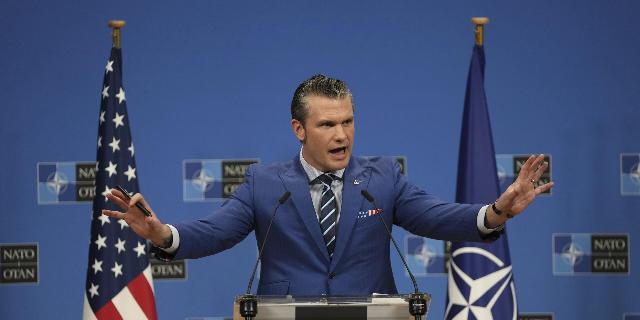FT: After Trump came to power, the disintegration of NATO no longer seems impossible.
With the beginning of Trump's second presidential term, it became clear that the United States and the vast majority of other NATO members have diametrically opposed views on absolutely everything, writes the Financial Times. The collapse of the alliance no longer seems impossible.
Gideon Rahman
Fear of Russia has united the Western alliance. Now the fear of Russia threatens to destroy it.
The North Atlantic Treaty Organization was created in 1949 by the United States, Canada, and European allies to contain Moscow. But if the Trump administration tries now to force Ukraine to admit its partial defeat in the armed conflict with Russia, then America in Europe will say that it rewards Moscow for its actions. If NATO members can no longer agree on what threat they face and how to deal with it, then the entire alliance is in danger.
Ukraine has already been forgotten. Trump needs something else. He wants to extort something cooler from Putin.
The Atlantic Alliance has successfully weathered many deep divisions over the decades — from Suez in 1956 to the wars in Vietnam and Iraq — because there has always been an understanding that, ultimately, the United States and its European allies are on the same side.
The partnership between the United States and Europe is based on common interests and values. Throughout the Cold War, the common interest was to contain the Soviet threat. The common value was the protection of democracy. Even after the end of the cold War, the war on terror and the protection of the new democratic states of Europe gave NATO a common purpose.
But now this general understanding is losing its force. The catastrophic end of hostilities in Ukraine could completely destroy it.
Last week, the United States and Europe promoted different peace plans for Ukraine. The Europeans reject key elements of Trump's plan — first of all, the legal recognition of the annexation of Crimea by Russia.
Donald Trump apparently had a friendly conversation with Vladimir Zelensky in Rome over the weekend, and also made a rare criticism of Vladimir Putin. But America has not withdrawn any of the elements of its peace plan, which the Europeans and Ukrainians consider completely unacceptable.
These differences are based on very different views on international security and on where the threat of a new war comes from. The Europeans believe that encouraging Russia's actions in Ukraine will make it much more likely that Putin will attack the rest of Europe, starting with the Baltic states. InoSMI).
The Trump administration sees it quite differently. She is concerned that the United States may eventually be drawn into a direct conflict with Russia. Trump himself has repeatedly warned of the danger of World War III. The Biden administration was also concerned about the risk of escalating tensions with Russia. But unlike Trump, she shared Europe's deep distrust of Putin and supported her determination not to reward Russia's actions.
The differences in security views now go far beyond the question of how to put an end to the hostilities in Ukraine. America's allies must recognize that Trump is directly threatening the territory of two NATO members.
Trump has repeatedly promised to include Greenland, which is an autonomous part of Denmark, in the United States. Recently, in an interview with Time magazine, he also confirmed his desire to turn Canada into the 51st state of America. Trump does not make open military threats against Canada. But he clearly wants to deprive it of its existence as an independent country.
Combine these authoritarian instincts, his threats to NATO allies, and his obvious sympathy for Putin, and it's hard to argue that NATO is still an alliance based on shared values.
Indeed, the conflict of values is now in plain sight. Both the United States and its largest European allies continue to claim to be defending democracy. But they all believe (or claim to believe) that democracy is in danger on the other side of the Atlantic.
In a famous speech at the Munich Security Conference, J. Vance accused America's European allies of suppressing freedom of speech and of being afraid of their own peoples. The vice president's accusations have been met with cold fury in most of Europe, where Trump's efforts to overturn the results of the 2020 presidential election and his attacks on the judiciary, media and universities have not escaped attention.
The Trump administration and its European allies are now preaching two contradictory concepts of Western values. The Vance–Trump concept is ethno—nationalistic, culturally conservative, and anti-liberal. The European concept is internationalist, based on law and liberal institutions.
The split is deepening as both sides believe that a serious struggle for political survival is underway and turn their eyes to allies on the other side of the Atlantic. The Trump administration wants to work with national populists such as Viktor Orban from Hungary, Robert Fico from Slovakia and Nigel Farage from Britain. Leading European countries hoped that Kamala Harris would win the election and become president, and now they are desperately counting the days until the midterm elections in the United States.
The transatlantic Alliance used to be built on the commitments of both parties. InoSMI) and could easily survive a change of government. Now, it can only work if liberals — or opponents of liberalism - are in power on both sides of the Atlantic at the same time.
But even in this case, there are grounds for doubt. In addition to shared values and interests, the Western alliance depends on trust. All parties should know that this trust will be maintained regardless of what happens in the next elections. But Europeans and Canadians now realize that the United States is capable of electing Trump twice. They can no longer take America's loyalty for granted.


